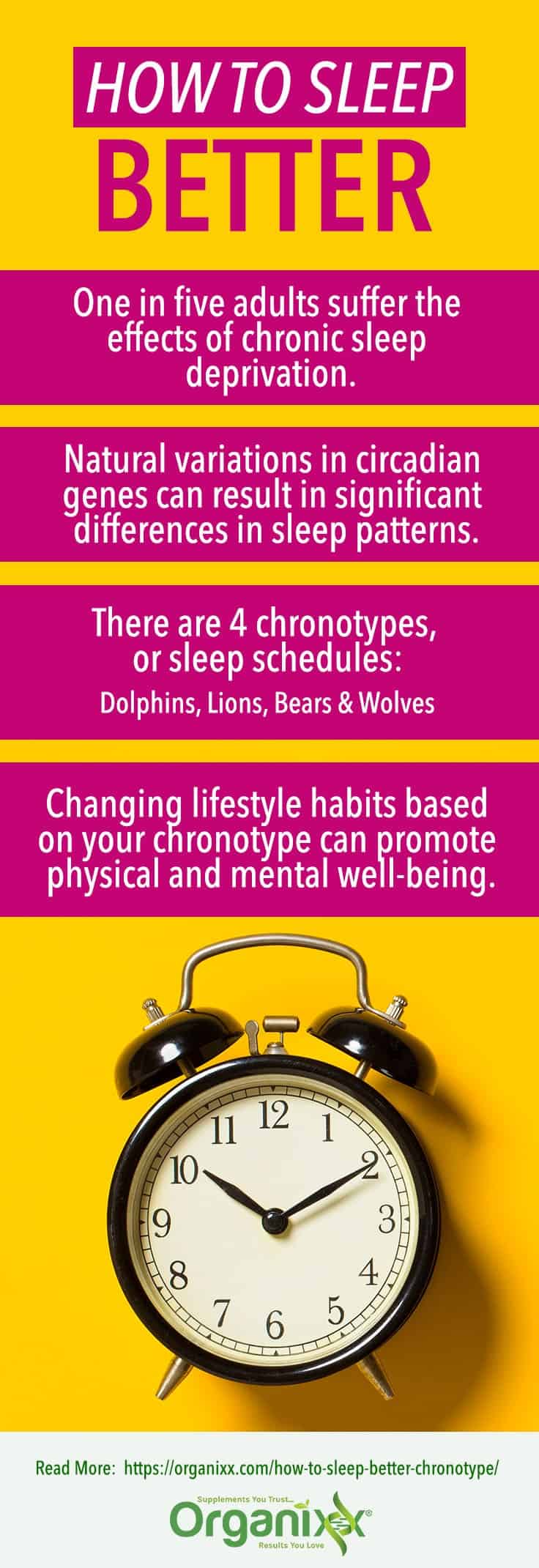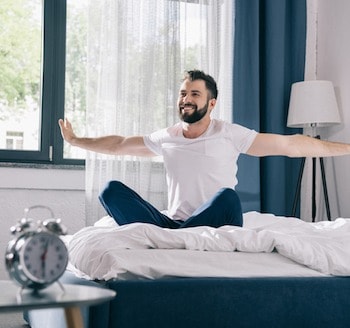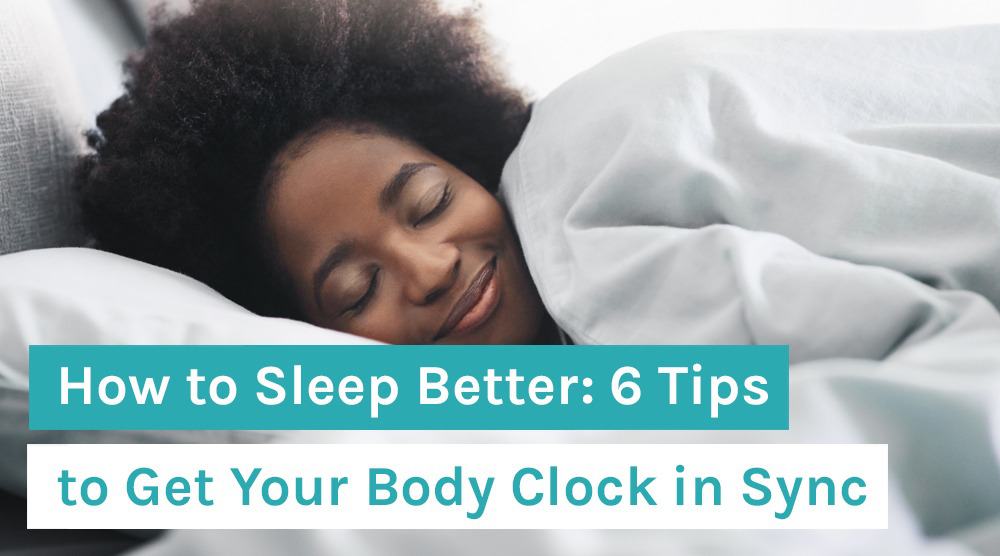How to Sleep Better: 6 Tips to Get Your Body Clock in Sync
In a hurry? Click here to read the Article Summary...
Are you one of the 1 in 5 adults who suffer the effects of chronic sleep deprivation? It’s a widespread public health problem, with 45% of Americans reporting that poor or insufficient sleep affected their daily activities at least once in the past week [1]. Sleep deprivation is related to many major health issues such as cardiovascular problems, obesity, memory problems, and anxiety. Not surprisingly, it is also associated with increased incidence of car accidents, missed days at work, and relationship troubles.
Fortunately, science can teach us how to sleep better.
There’s no doubt that sleep is important. Research shows that key brain pathways are blocked or contorted when you don’t get enough sleep, a fact demonstrated by both brain imaging and behavioral studies. This poses a big problem for memory, learning, and mental health because sleep loss has a profound effect on the function of the hippocampus, a region of the brain involved with memory, learning, and emotions.
 A recent study found that a loss of as little as five hours of sleep impaired the process by which information is consolidated and stored in the hippocampus [2].
A recent study found that a loss of as little as five hours of sleep impaired the process by which information is consolidated and stored in the hippocampus [2].
In fact, it was recently discovered that five hours of lost sleep even reduced spine density in mice [3]. Whether that occurs in humans remains to be seen, but it is easy to conclude that there are effects of sleep deprivation which we may not suspect.
There are many causes of sleep deprivation, such as anxiety or irregular hours at work. People who must rise earlier than their biological clocks would prefer can also suffer from sleep deprivation.
We have all heard that ”the early bird gets the worm” and so many of us are rising before we feel like it to get things accomplished. If your body clock makes you more of a night owl than an early bird, it turns out there’s a good reason for that.
What Are Circadian Genes?
Sleep research is currently a hot field of science. Scientists are discovering there are several genes that govern our sleep cycles and circadian rhythms. They are investigating how these circadian genes do their work and how they can be altered. They hope to find treatments and therapies to help people with sleep disorders learn how to sleep better, and to further study the health problems associated with such disorders [4].
Natural variations in circadian genes can result in significant differences in sleep schedules from person to person. For instance, you might feel your best rising at dawn and going to bed early, while someone else might do better sleeping late in the morning and staying up late. But our circadian clocks do much more than tell us when to wake up and go to bed.
Did you know that these circadian clocks are in almost all organ systems of the body… like the liver, brain, and heart? These clocks are intimately involved with the cellular processes of each tissue/organ throughout the day.
Different factors can cause the circadian rhythms in our organs to fall out of sync with one another, resulting in various health issues. For instance, studies show that shift workers (who account for about 15% of the workforce) suffer from increased incidence of cardiovascular disease, obesity, diabetes, and other metabolic diseases [5].
People who frequently travel across time zones can also experience disrupted circadian rhythms and subsequent health problems. One research team has discovered that preventing a gene known as SIK1 from being expressed can ease the effects of jet lag [6].
Another study found that a gene known as ID2 regulates how light resets the circadian clock, and how that clock controls other processes, such as the timing of fat and sugar metabolism [7].

Chronobiology and the 4 Sleep Chronotypes
Dr. Michael Breus is a clinical psychologist and sleep researcher who has studied chronobiology (the study of circadian rhythms) for many years, both through research and clinical practice. When working with insomnia patients in his clinic, Dr. Breus noticed that some patients were not responding to standard treatments, leading him to discover new ways to teach them how to sleep better.
Dr. Breus found that a person’s natural preferences for sleep are dictated by chronotypes, which are determined by a gene known as PER3. According to Dr. Breus, there are four different chronotypes, or sleep styles, which he has categorized as dolphins, lions, bears, and wolves. These four chronotypes differ widely from the old “early bird” and “night owl” classifications.
Here is a brief description of each chronotype. Which one best describes your sleep style?
#1. Dolphins
Light sleepers with low sleep drive, dolphins sleep with only half their brain, while the other half remains alert and wakeful to the smallest noise. Dolphins tend to be cautious, introverted, intelligent, detail oriented, slightly neurotic, and are most alert late at night.

#2. Lions
Early risers, lions, are bright-eyed and bushy-tailed, raring to go from first light. They like to be with friends but can also be introverted. They retire early, generally fall asleep easily, and have medium sleep drive.
Lions are natural born leaders and tend to be stable, optimistic, analytical, goal oriented, conscientious, and practical.
Lions are most alert from the morning until around noon, and they don’t like to nap because that time could be used to do something useful.
#3. Bears
Good sleepers with high sleep drive, bears don’t wake easily, are likely to hit that snooze button a couple of times, and tend to feel tired by mid-evening. They are most alert mid-morning to mid-afternoon.
Bears are friendly, fun-loving extroverts, and they love naps and eating, and are often hungry. Tending to be cautious and risk-averse, bears are team players, balanced thinkers, and dislike drama. An estimated 50% of the population are bears.
#4. Wolves
Night oriented, wolves have trouble waking before 9:00 am, tend to be groggy until midday, and do not feel tired until midnight or later. Wolves are most alert around 7:00 pm. Wolves can be impulsive, moody, creative, and pessimistic. They are fearless risk takers, emotionally intense, and put pleasure above all else. Being out of sync with 80% of the population, they are often seen as slackers and tend to battle with mood disorders like depression and anxiety.
How Your Sleep Chronotype Can Change Over Time
As you might expect, we do not keep the same chronotype all throughout our lives. On average, teenagers tend to be wolves until they reach early adulthood and begin working, and then they may become bears. Seniors tend to be dolphins or lions. Toddlers are usually lions. Some people can fall into two categories.
Dr. Breus discovered that by understanding his patients’ chronotypes, he could teach them how to sleep better. Having them make minor changes in lifestyle produced remarkable improvements in sleep quality.
Factors that can impact sleep include:
- the timing of meals and exercise
- caffeine consumption
- meditation
- mental engagement
- social media and TV habits
- exposure to artificial light
- sexual activity
Not only did his patients sleep better, but they also noticed improvements in their general health, memory, mood, concentration, and other key areas of their lives. (For more information on how to understand your chronotype and optimize your daily schedule, you can check out Dr. Breus’s book “The Power of When.”)
Other sleep researchers agree that there are some steps we can take to help get our internal body clocks in sync with our schedules, helping us optimize our health both physically and mentally.
How to Sleep Better: 6 Tips to Get Your Body Clock in Sync
#1 – Understand that the light of dawn resets the internal body clock and helps us synchronize with the outside world. Get a good dose of sunlight in the morning and at lunchtime. No sun where you live? Get yourself a lamp that simulates natural sunlight.
#2 – If you know you need seven hours of sleep to feel good, make sure you get it.
#3 – Be as consistent as you can with your schedule. Our bodies like getting up and going to bed at the same time each day. Research has even found that keeping regular meal times and going to bed early can help ward off anxiety and depression [8].
#4 – Turn off technology that emits a bright light at least one hour before bed. The blue light emitted from phones and computers suppresses the release of melatonin, the hormone that helps you sleep. If you watch television, keep the monitor at least 10 feet away from your eyes.
#5 – Eat the right food at the right time based on your chronotype [9].
#6 – Most importantly, do not deprive yourself of sleep. Getting enough sleep does make a big difference to your health and emotional well-being.
Magnesium deficiency is linked to stress, diabetes, heart disease, osteoporosis, chronic fatigue syndrome, depression, anxiety, trouble sleeping, sore muscles, migraines, and many more debilitating health conditions.
If your body needs magnesium, you want the most beneficial kind your body can actually absorb. Organixx Magnesium 7 gives you seven (7) of the very best, most bioavailable types of elemental magnesium available.

 Sources:
Sources:
Article Summary
One in five adults suffer the effects of chronic sleep deprivation.
Natural variations in circadian genes can result in significant differences in sleep patterns.
There are 4 chronotypes, or sleep schedules:
- Dolphins
- Lions
- Bears
- Wolves
Changing lifestyle habits based on your chronotype can promote physical and mental well-being.





I am a lion, early bird do not like to take a nap and keep myself active all day long. I am easy to follow sleep but if I wake up at middle of the night I am so difficult to go back sleep. I am taking Magnesium 7 for almost a month and seems like is helping me to go back sleep. It is something else I can do?
Hello Lucia, Thank you for your question. Please check out this article that gives some tips on how to manage this situation. https://organixx.com/3-tips-to-stay-asleep-and-why-youre-waking-up/ I hope you find it helpful. Have a wonderful day! :)
I am a Lion what type of food should I eat & what should I not eat. I try not to eat after 8:00 pm and I usually go to sleep by 10:00 pm and wake between 4 to 6 am in the morning??
Hi Barbara, We have not done extensive research on they chronotypes and eating. However, if you click the arrow next to the word Sources over the article summary it will provide you sources we cited for this article. Number 9 links to a book where we gathered some of this information. It may be helpful in answering this question. Thank you for being here with us. Have a great day! :)
I am a dolphin.....what kind of food and when to eat will help me sleep?
Hi Debbie, thanks for tuning in!
We recommend that you visit the official page of Dr. Michael Breus and the Chronobiology and the 4 Sleep Chronotypes, for more information:
https://thepowerofwhenquiz.com/
We hope this helps!